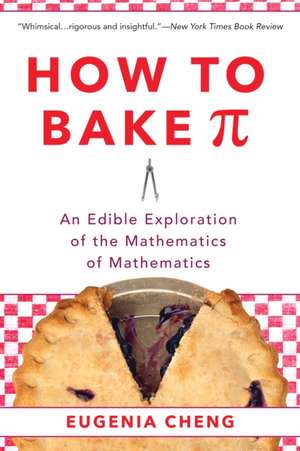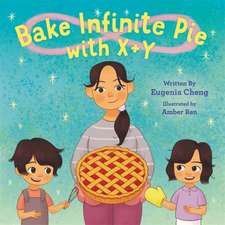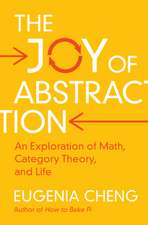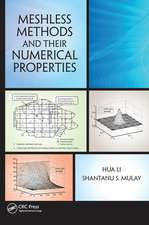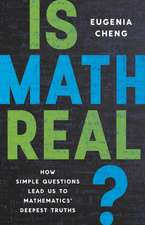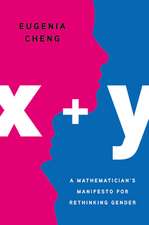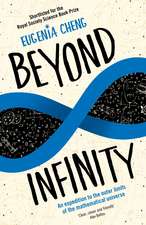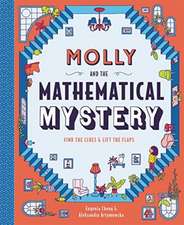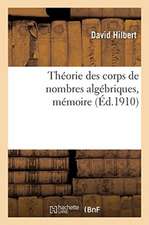How to Bake Pi: An Edible Exploration of the Mathematics of Mathematics
Autor Eugenia Chengen Limba Engleză Paperback – 10 mai 2016
"Whimsical...rigorous
and
insightful."
--New
York
Times
Book
Review
What
is
math?
How
exactly
does
it
work?
And
what
do
three
siblings
trying
to
share
a
cake
have
to
do
with
it?
InHow
to
Bake
Pi,
math
professor
Eugenia
Cheng
provides
an
accessible
introduction
to
the
logic
and
beauty
of
mathematics,
powered,
unexpectedly,
by
insights
from
the
kitchen.
We
learn
how
the
béchamel
in
a
lasagna
can
be
a
lot
like
the
number
five,
and
why
making
a
good
custard
proves
that
math
is
easy
but
life
is
hard.
At
the
heart
of
it
all
is
Cheng's
work
on
category
theory,
a
cutting-edge
"mathematics
of
mathematics,"
that
is
about
figuring
out
how
math
works.
Combined with her infectious enthusiasm for cooking and true zest for life, Cheng's perspective on math is a funny journey through a vast territory no popular book on math has explored before. So, what is math? Let's look for the answer in the kitchen.
Combined with her infectious enthusiasm for cooking and true zest for life, Cheng's perspective on math is a funny journey through a vast territory no popular book on math has explored before. So, what is math? Let's look for the answer in the kitchen.
| Toate formatele și edițiile | Preț | Express |
|---|---|---|
| Paperback (2) | 58.18 lei 3-5 săpt. | +20.49 lei 4-10 zile |
| Profile – iun 2016 | 58.18 lei 3-5 săpt. | +20.49 lei 4-10 zile |
| BASIC BOOKS – 10 mai 2016 | 106.14 lei 3-5 săpt. |
Preț: 106.14 lei
Nou
Puncte Express: 159
Preț estimativ în valută:
20.32€ • 20.94$ • 17.15£
20.32€ • 20.94$ • 17.15£
Carte disponibilă
Livrare economică 10-24 februarie
Preluare comenzi: 021 569.72.76
Specificații
ISBN-13: 9780465097678
ISBN-10: 0465097677
Pagini: 304
Ilustrații: B/w illustrations throughout
Dimensiuni: 140 x 210 x 22 mm
Greutate: 0.25 kg
Ediția:First Trade Paper Edition
Editura: BASIC BOOKS
Colecția Basic Books
ISBN-10: 0465097677
Pagini: 304
Ilustrații: B/w illustrations throughout
Dimensiuni: 140 x 210 x 22 mm
Greutate: 0.25 kg
Ediția:First Trade Paper Edition
Editura: BASIC BOOKS
Colecția Basic Books
Notă biografică
Eugenia
Chengis
tenured
in
the
School
of
Mathematics
and
Statistics
at
the
University
of
Sheffield.
She
is
the
Scientist
in
Residence
at
the
School
of
the
Art
Institute
of
Chicago,
where
she
currently
lives.
Recenzii
"[Cheng's]
book,
a
very
gentle
introduction
to
the
main
ideas
of
mathematics
in
general
and
category
theory
in
particular,
exudes
enthusiasm
for
mathematics,
teaching,
and
creative
recipes.
Category
theory
is
dangerously
abstract,
but
Cheng's
writing
is
down-to-earth
and
friendly.
She's
the
kind
of
person
you'd
want
to
talk
to
at
a
party,
whether
about
math,
food,
music,
or
just
the
weather....
Cheng's
cheerful,
accessible
writing
and
colorful
examples
makeHow
to
Bake
Pian
entertaining
introduction
to
the
fundamentals
of
abstract
mathematical
thinking."—Evelyn
Lamb,
Scientific
American's
Roots
of
Unity
blog
"[A]slyly illuminating dispatch on the deep meaning of mathematics.... Chengmanages to do for us what the mathematician Keith Devlin has saidmathematicians do for themselves: she compels us to see numbers and symbols asvivid characters in an ongoing drama, a narrative in which we are alternatelyobservers and participants."—Natalie Angier, The American Scholar
"[O]ftenentertaining...frequently illuminating.... [How to Bake Pi] offersenough nourishment for the brain to chew on for a long time."—Columbus Dispatch
"In her new book,How to Bake Pi, mathematician/baker Eugenia Cheng offers a novel, mathematical approach to cooking....How to Bake Piis more than a mathematically-minded cookbook. It is just as much a book about mathematical theory and how we learn it. The premise at the heart of the book is that the problem that stops a cookbook from teaching us how to cook is the same problem that makes math classes so bad at actually teaching us to do math."—Ria Misra, io9
"Chengnever quite overeggs her metaphor of the mathematician as chef...and her toneis clear, clever and friendly. Even at her most whimsical she is rigorous andinsightful. Potentially confusing ideas are expressed with a matter-of-factsimplicity....How to Bake Piis a welcome addition to the popular-mathshelf, unusual not only because of its quirky premise but also because Cheng isa woman, a lucid and nimble expositor, and unashamedly proud of her domesticobsessions.... It would be wonderful if this book attracted a new audience tothe field. And there's no better ambassador (or dinner-party host, I'd wager)than Eugenia Cheng."—Alex Bellos, New York Times Book Review
"Invokingplenty of examples from cooking and baking, as well as other everyday-lifesituations such as calculating a taxi fare, searching for love through onlinedating services and training for a marathon, [Cheng] explains abstractmathematical ideas--including topology and logic--in understandable ways....Her lively, accessible book demonstrates how important and intriguing such apursuit can be."—Scientific American
"This is the best book imaginable to introduce someone who doesn't think they are interested in mathematics at all to some of the deep ideas of category theory, especially if they like to bake."—MAA Reviews
"Beginningeach chapter with a recipe, Cheng converts the making of lasagna, pudding,cookies, and other comestibles into analogies illuminating the mathematicalenterprise. Though these culinary analogies teach readers about particularmathematical principles and processes, they ultimately point toward thefundamental character of mathematics as a system of logic, a system presentingdaunting difficulties yet offering rare power to make life easier. Despite herzeal for mathematical logic, Cheng recognizes that such logic begins infaith--irrational faith--and ultimately requires poetry and art to complementits findings. A singular humanization of the mathematical project."—Booklist, starred review
"Chengis exceptional at translating the abstract concepts of mathematics intoordinary language, a strength aided by a writing style that showcases theworkings of her curious, sometimes whimsical mind. This combination allows herto demystify how mathematicians think and work, and makes her love formathematics contagious."—Publishers Weekly, starred review
"With this delightfully surprising book, Eugenia Cheng reveals the hidden beauty of mathematics with passion and simplicity. After readingHow to Bake Pi, you won't look at math (nor porridge!) in the same way ever again."—Roberto Trotta, Astrophysicist, Imperial College London and author of The Edge of the Sky
"Mathis a lot like cooking. We start with the ingredients we have at hand, try tocook up something tasty, and are sometimes surprised by the results. Does thisseem odd? Maybe in school all you got was stale leftovers! Try somethingbetter: Eugenia Cheng is not only an excellent mathematician and pastry chef,but a great writer, too."—John Baez, Professor of Math at the University of California, Riverside
"Fromclotted cream to category theory, neither cookery nor math are what you thoughtthey were. But deep down they're remarkably similar. A brilliant gourmet feastof what math isreallyabout."—Ian Stewart, Emeritus Professor of Mathematics at the University of Warwick, and author of Visions of Infinity and Professor Stewart's Incredible Numbers
"An original book using recipes to explain sophisticated math concepts to students and even the math-phobic.... [Cheng] is a gifted teacher... A sharp, witty book to press on students and even the teachers of math teachers,"—Kirkus Reviews
"[A]well-written, easy-to-read book."—Library Journal
"Acurious cookbook for the mathematical omnivore."—The Irish Times(Ireland)
"EugeniaCheng's charming new book embeds math in a casing of wry, homespun metaphors:math is like vegan brownies, math is like a subway map, math is like a messydesk. Cheng is at home with math the way you're at home with brownies, maps,and desks, and by the end ofHow to Bake Pi, you might be,too."—Jordan Ellenberg, Professor of Mathematics, University of Wisconsin-Madison, and author of How Not to Be Wrong
"Whata charming and original book! The central analogy--math is like cooking--turnsout to be surprisingly apt and often funny. Light and tasty, yet so, so goodfor you,How to Bake Piis a real treat."—Steven Strogatz, Professor of Mathematics, Cornell University and author of The Joy of x
"[A]slyly illuminating dispatch on the deep meaning of mathematics.... Chengmanages to do for us what the mathematician Keith Devlin has saidmathematicians do for themselves: she compels us to see numbers and symbols asvivid characters in an ongoing drama, a narrative in which we are alternatelyobservers and participants."—Natalie Angier, The American Scholar
"[O]ftenentertaining...frequently illuminating.... [How to Bake Pi] offersenough nourishment for the brain to chew on for a long time."—Columbus Dispatch
"In her new book,How to Bake Pi, mathematician/baker Eugenia Cheng offers a novel, mathematical approach to cooking....How to Bake Piis more than a mathematically-minded cookbook. It is just as much a book about mathematical theory and how we learn it. The premise at the heart of the book is that the problem that stops a cookbook from teaching us how to cook is the same problem that makes math classes so bad at actually teaching us to do math."—Ria Misra, io9
"Chengnever quite overeggs her metaphor of the mathematician as chef...and her toneis clear, clever and friendly. Even at her most whimsical she is rigorous andinsightful. Potentially confusing ideas are expressed with a matter-of-factsimplicity....How to Bake Piis a welcome addition to the popular-mathshelf, unusual not only because of its quirky premise but also because Cheng isa woman, a lucid and nimble expositor, and unashamedly proud of her domesticobsessions.... It would be wonderful if this book attracted a new audience tothe field. And there's no better ambassador (or dinner-party host, I'd wager)than Eugenia Cheng."—Alex Bellos, New York Times Book Review
"Combined
with
infectious
enthusiasm
for
cooking
and
a
zest
for
life,
Cheng's
perspective
on
math
becomes
this
singular
book:
a
funny,
lively,
and
clear
journey
no
popular
book
on
math
has
explored
before.How
to
Bake
Pi...will
dazzle,
amuse,
and
enlighten."
—Gambit
Weekly"Invokingplenty of examples from cooking and baking, as well as other everyday-lifesituations such as calculating a taxi fare, searching for love through onlinedating services and training for a marathon, [Cheng] explains abstractmathematical ideas--including topology and logic--in understandable ways....Her lively, accessible book demonstrates how important and intriguing such apursuit can be."—Scientific American
"This is the best book imaginable to introduce someone who doesn't think they are interested in mathematics at all to some of the deep ideas of category theory, especially if they like to bake."—MAA Reviews
"Beginningeach chapter with a recipe, Cheng converts the making of lasagna, pudding,cookies, and other comestibles into analogies illuminating the mathematicalenterprise. Though these culinary analogies teach readers about particularmathematical principles and processes, they ultimately point toward thefundamental character of mathematics as a system of logic, a system presentingdaunting difficulties yet offering rare power to make life easier. Despite herzeal for mathematical logic, Cheng recognizes that such logic begins infaith--irrational faith--and ultimately requires poetry and art to complementits findings. A singular humanization of the mathematical project."—Booklist, starred review
"Chengis exceptional at translating the abstract concepts of mathematics intoordinary language, a strength aided by a writing style that showcases theworkings of her curious, sometimes whimsical mind. This combination allows herto demystify how mathematicians think and work, and makes her love formathematics contagious."—Publishers Weekly, starred review
"With this delightfully surprising book, Eugenia Cheng reveals the hidden beauty of mathematics with passion and simplicity. After readingHow to Bake Pi, you won't look at math (nor porridge!) in the same way ever again."—Roberto Trotta, Astrophysicist, Imperial College London and author of The Edge of the Sky
"Mathis a lot like cooking. We start with the ingredients we have at hand, try tocook up something tasty, and are sometimes surprised by the results. Does thisseem odd? Maybe in school all you got was stale leftovers! Try somethingbetter: Eugenia Cheng is not only an excellent mathematician and pastry chef,but a great writer, too."—John Baez, Professor of Math at the University of California, Riverside
"Fromclotted cream to category theory, neither cookery nor math are what you thoughtthey were. But deep down they're remarkably similar. A brilliant gourmet feastof what math isreallyabout."—Ian Stewart, Emeritus Professor of Mathematics at the University of Warwick, and author of Visions of Infinity and Professor Stewart's Incredible Numbers
"An original book using recipes to explain sophisticated math concepts to students and even the math-phobic.... [Cheng] is a gifted teacher... A sharp, witty book to press on students and even the teachers of math teachers,"—Kirkus Reviews
"[A]well-written, easy-to-read book."—Library Journal
"Acurious cookbook for the mathematical omnivore."—The Irish Times(Ireland)
"EugeniaCheng's charming new book embeds math in a casing of wry, homespun metaphors:math is like vegan brownies, math is like a subway map, math is like a messydesk. Cheng is at home with math the way you're at home with brownies, maps,and desks, and by the end ofHow to Bake Pi, you might be,too."—Jordan Ellenberg, Professor of Mathematics, University of Wisconsin-Madison, and author of How Not to Be Wrong
"Whata charming and original book! The central analogy--math is like cooking--turnsout to be surprisingly apt and often funny. Light and tasty, yet so, so goodfor you,How to Bake Piis a real treat."—Steven Strogatz, Professor of Mathematics, Cornell University and author of The Joy of x
